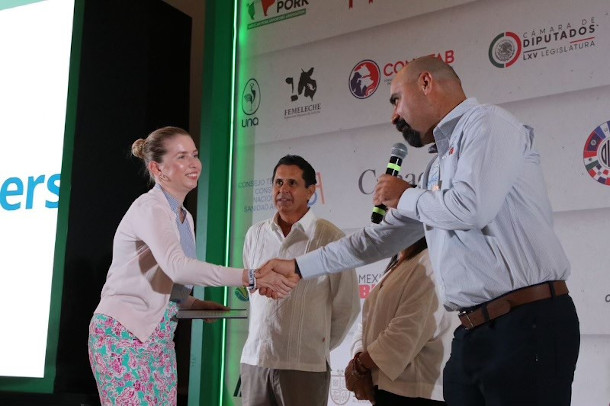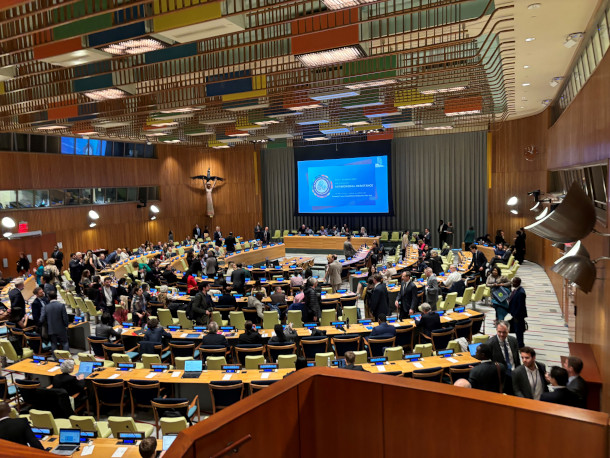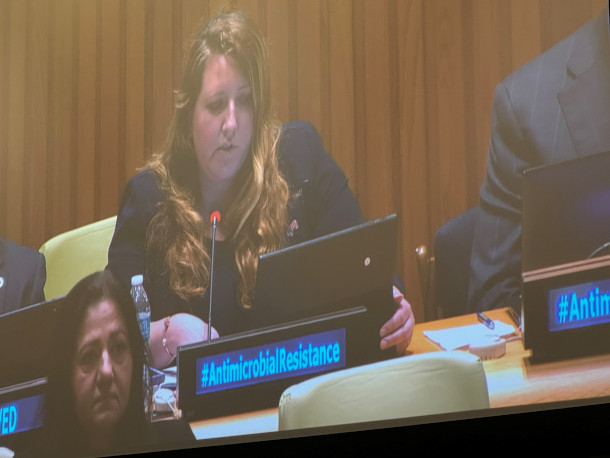Capital Update — For the Week Ending May 17, 2024
In this week’s National Pork Producers Council (NPPC) Friday recap: NPPC secures 100% of priorities in House Agriculture Committee Farm Bill; NPPC participates in Mexican Pork Congress; NPPC’s Johnson defends judicious antimicrobial use at U.N. hearing; NPPC weighs in on U.K. meat labeling proposal; and NPPC’s Forseth provides updates on Prop. 12. Take a deeper dive below.
NPPC Secures 100% of Priorities in House Agriculture Committee Farm Bill
What happened: NPPC scored big wins for pork producers in the House Agriculture Committee’s 2024 Farm Bill, the text of which was released this week by panel Chairman G.T. Thompson (R-PA).
All the U.S. pork industry’s legislative priorities are included in the lower chamber’s five-year agricultural blueprint, including provisions that would:
- Address problems caused by California’s Proposition 12, which bans the sale in that state of pork from hogs born to sows raised anywhere in housing that does not meet California’s arbitrary standards.
- Double the funding for the U.S. Department of Agriculture’s Market Access Program (MAP) and Foreign Market Development (FMD) Program, which help promote U.S. exports.
- Provide $233 million for each fiscal year through fiscal 2009 for resources to protect the nation’s food supply from foreign animal diseases, including:
- $10 million a year for the National Animal Health Laboratory Network (NAHLN).
- $70 million a year for the National Animal Disease Preparedness and Response Program (NADPRP).
- $153 million a year for the National Animal Vaccine and Veterinary Countermeasures Bank (NAVVCB).
- Codify USDA’s National Detector Dog Training Center, which trains canines used at U.S. ports of entry to detect agricultural contraband.
- Reauthorize and increase funding for the federal Feral Swine Eradication Program.
The Senate Committee on Agriculture, Nutrition, and Forestry is expected to release the full text of its Farm Bill soon.
NPPC’s take: “America’s pork producers appreciate Chairman G.T. Thompson’s willingness to listen, put pen to paper, and address the most pressing issues facing the agriculture industry across the country – a prime example of how our government should work,” said NPPC President Lori Stevermer, a pork producer from Easton, Minnesota. “The inclusion of pork producers’ top priorities in the 2024 House Farm Bill is a testament to our industry’s ability to unite and speak up about our common challenges.”
Why it matters: The five-year farm bill sets farm, conservation, forestry, and nutrition policy and authorizes various agricultural programs, including ones related to foreign animal disease preparation and prevention and export promotion.
NPPC Participates in Mexican Pork Congress
What happened: NPPC President and Minnesota pork producer Lori Stevermer, President-elect and Ohio pork producer Duane Stateler, Vice President and Iowa pork producer Rob Brenneman, and Past President and Missouri pork producer Scott Hays – who chairs NPPC’s Trade Policy Committee – participated in the Third Intercontinental Congress of Pig Farmers May 14-18 in Puerto Vallarta, Mexico. NPPC CEO Bryan Humphreys and Vice President of Government Affairs Maria C. Zieba also attended the meeting.
The Congress saw representatives from pork industries around the world gathered to discuss the challenges for the industry, as well as best practices that help boost the business. There also were talks on pressing issues such as animal health, biosecurity succession planning, and sustainability practices. NPPC also accepted the invitation from the Mexican pork organization Opormex to be the honored guest for the 2025 Congress.
At the beginning of the Congress, officers of the pork organizations in Canada, Mexico, and the United States – respectively, the Canadian Pork Council, Opormex, and NPPC – held a trilateral meeting to address issues of importance to pork production in North America. Among the topics raised were animal welfare and health and the need for organizations to collaborate to reduce the risk of animal diseases.
NPPC’s take: The Mexican Pork Congress is an opportunity for pork industry representatives to exchange ideas, discuss mutual challenges and possible solutions, and explore areas of common interest.
Why it matters: The U.S. pork industry enjoys mutually beneficial relationships with Canada and Mexico, making it imperative the three countries share information and maintain communication. Mexico was the No. 1 volume and value market for U.S. pork producers in 2023. Canada was the No. 4 market, taking just under 220,000 MT valued at about $876 million.

Representatives from the U.S., Mexican, and Canadian pork industries meet for the Intercontinental Congress of Pig Farmers.
NPPC’s Zieba accepts the invitation from Opormex Executive Director Ivan Espinosa for the U.S. to be the honored guest for the 2025 Congress.

NPPC’s Johnson Defends Judicious Antimicrobial Use at U.N. Hearing
What happened: NPPC’s Dr. Ashley Johnson, director of food policy, spoke at the United Nations’ multi-stakeholder hearing on antimicrobial resistance (AMR).
In background notes on the hearing, the U.N. said that “[w]hile some progress has been achieved over the past years, AMR remains a significant health and developmental challenge, being listed as one of the top 10 global public health threats facing humanity.”
In the hearing’s session on livestock, Dr. Johnson defended pork producers’ stewardship of antimicrobial use, highlighting the industry’s track record of and commitment to working with veterinarians to judiciously use antimicrobials, training farm employees in Pork Quality Assurance Plus, and more. Dr. Johnson stressed NPPC’s importance of being a scientific voice to combat ideas of global antimicrobial standards, surveillance, and other potential initiatives that would undermine producer-veterinarian partnerships and subsequent decisions for herd health.
A summary of the hearing will be used as a resource for a “high-level” U.N. meeting on AMR scheduled for Sept. 26, 2024.
NPPC’s take: Pork producers care deeply about the health and well-being of their animals and have a moral obligation to raise them humanely and compassionately. Healthy animals ensure safe food for consumers. NPPC advocates for science-based approaches to swine health and production and opposes efforts to dictate on-farm production practices.
Why it matters: The multi-stakeholder hearing provided an opportunity for stakeholders to contribute to the ongoing preparatory process for a high-level U.N. meeting on AMR. Participants exchanged views on key priorities for that meeting and explored challenges and potential solutions needed for effectively addressing AMR.

United Nations participants discuss antimicrobial resistance in New York City.
Dr. Johnson advocates on behalf of the U.S. pork industry at the United Nations.

NPPC Weighs In on U.K. Meat Labeling Proposal
What happened: NPPC weighed in on a labeling scheme for meat being considered by the United Kingdom that could negatively impact the U.S. pork industry’s ability to export to the U.K. market.
The U.K. government wants to update its country-of-origin labeling (COOL) regulation for domestic and imported meat, including requiring labels on processed meat. It also would mandate “method of production” information on labels for imported meat, differentiating product as falling below, meeting, or exceeding U.K. animal welfare regulations.
In answers submitted to the U.K. Department for Environment, Food & Rural Affairs, NPPC said COOL for processed meat “would add significant complexity to sourcing decisions, which would create unnecessary barriers to trade” and be a likely violation of the World Trade Organization’s (WTO) Technical Barriers to Trade Agreement. (The WTO ruled against a 2009 U.S. COOL regulation, finding it discriminated against meat producers in other countries. The United States in 2015 repealed its COOL rule rather than risk trade retaliation.)
NPPC also raised concerns about the potential negative impact such labeling may have on consumers’ perceptions about products and their purchasing decisions. “The new labeling has the potential to create consumer confusion and raise doubts about the safety or quality of the product, especially when U.K. consumers are exposed to unfounded scare tactics about imported meat,” said NPPC.
Specific to the method of production information, NPPC pointed out that production practices vary widely within and across countries. Such information “will draw unnecessary connections between the method of production and food quality and safety,” NPPC wrote. It would raise production costs and decrease demand by intimating products with such a label are of lower quality.
What it means: Origin labeling for processed products would be complex, encouraging processors to limit origins and discriminate against imported inputs for processed products. Requiring imported products to include additional information on labels would increase production costs, serve as a barrier to trade, and create confusion among and raise costs for consumers.
NPPC’s Forseth Provides Update on Prop. 12
What happened: NPPC’s Dr. Anna Forseth, director of animal health, participated in the Meat Institute’s (formerly the North American Meat Institute) animal care and handling conference in Kansas City.
One of the event’s featured speakers, Forseth gave a presentation on California’s Proposition 12 and other state initiatives that focus on animal housing during a session on regulatory and legislative matters related to animal welfare. NPPC has been leading the animal agriculture industry’s fight against Proposition 12, which bans the sale in California of pork from hogs born to sows raised anywhere in housing that does not meet the state’s arbitrary standards.
Why it matters: Attendees at the animal care and handling conference heard from industry analysts and those in the restaurant and retail industry segments about consumers’ expectations for animal welfare. There also were discussions about prioritizing worker and animal safety through worker training and facility design, gene editing, animal welfare research, and artificial intelligence.